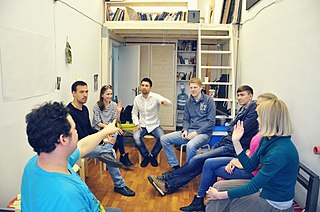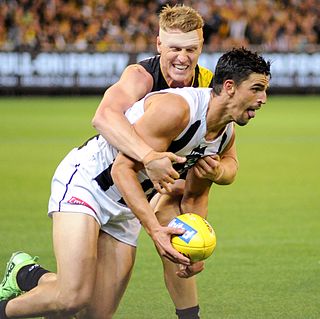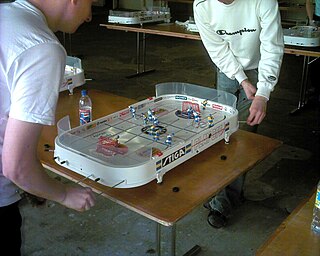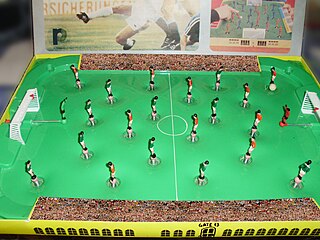
Hockey is a term used to denote a family of various types of both summer and winter team sports which originated on either an outdoor field, sheet of ice, or dry floor such as in a gymnasium. While these sports vary in specific rules, numbers of players, apparel, and playing surface, they share broad characteristics of two opposing teams using a stick to propel a ball or disk into a goal.

A player character is a fictional character in a video game or tabletop role-playing game whose actions are controlled by a player rather than the rules of the game. The characters that are not controlled by a player are called non-player characters (NPCs). The actions of non-player characters are typically handled by the game itself in video games, or according to rules followed by a gamemaster refereeing tabletop role-playing games. The player character functions as a fictional, alternate body for the player controlling the character.

A role-playing game is a game in which players assume the roles of characters in a fictional setting. Players take responsibility for acting out these roles within a narrative, either through literal acting or through a process of structured decision-making regarding character development. Actions taken within many games succeed or fail according to a formal system of rules and guidelines.

Party games are games that are played at social gatherings to facilitate interaction and provide entertainment and recreation. Categories include (explicit) icebreaker, parlour (indoor), picnic (outdoor), and large group games. Other types include pairing off (partnered) games, and parlour races. Different games will generate different atmospheres so the party game may merely be intended as an icebreakers, or the sole purpose for or structure of the party. As such, party games aim to include players of various skill levels and player-elimination is rare. Party games are intended to be played socially, and are designed to be easy for new players to learn.

Subbuteo is a tabletop football game in which players simulate association football by flicking miniature players with their fingers. The name is derived from the Neo-Latin scientific name Falco subbuteo, after a trademark was not granted to its creator Peter Adolph (1916–1994) to call the game "Hobby".

A recreation room is a room used for a variety of purposes, such as parties, games and other everyday or casual activities. The term recreation room is common in the United States, like the often disappearing room in the Simpsons. The term rumpus room is often common in Australia, New Zealand and Canada. In the United Kingdom, the most common term is games room, or sometimes den, although, as houses tend to be smaller in the UK, most houses don't have one. Some, however, will have a room specific to one particular game or entertainment unit often found in a recreation room, or some have a snug, which is a smaller cosy room for watching films and playing video games. Often children and teenagers entertain their friends in their home's rec room, which is often located in the basement, away from the main living areas of the house. Usually it is a larger space than a living room, enabling the area to serve multiple purposes and entertain moderately large groups.

Tabletop games or tabletops are games that are normally played on a table or other flat surface, such as board games, card games, dice games, miniature wargames, or tile-based games.

A contact sport is any sport where physical contact between competitors, or their environment, is an integral part of the game. For example, gridiron football. Contact may come about as the result of intentional or incidental actions by the players in the course of play. This is in contrast to noncontact sports where players often have no opportunity to make contact with each other and the laws of the game may expressly forbid contact. In contact sports some forms of contact are encouraged as a critical aspect of the game such as tackling, while others are incidental such as when shielding the ball or contesting an aerial challenge. As the types of contact between players is not equal between all sports they define the types of contact that is deemed acceptable and fall within the laws of the game, while outlawing other types of physical contact that might be considered expressly dangerous or risky such as a high tackle or spear tackle, or against the spirit of the game such as striking below the belt or other unsportsmanlike conduct. Where there is a limit as to how much contact is acceptable most sports have a mechanism to call a foul by the referee, umpire or similar official when an offence is deemed to have occurred.

An attribute is a piece of data that describes to what extent a fictional character in a role-playing game possesses a specific natural, in-born characteristic common to all characters in the game. That piece of data is usually an abstract number or, in some cases, a set of dice. Some games use different terms to refer to an attribute, such as statistic, (primary) characteristic or ability. A number of role-playing games like Fate do not use attributes at all.

Knock Out is a family tabletop game for two or more players published by the Milton Bradley Company in 1991.

A table hockey game, also called rod hockey game, stick hockey, bubble hockey, and board hockey, is a game for two players, derived from ice hockey. The game consists of a representation of a hockey rink; the players score goals by hitting a small puck into the opposing "net" with cutout figures that represent hockey players. The figures are manipulated by rods below the "ice": each one slides forward and back along its own narrow slot when the player pushes or pulls on the rod, or rotates to shoot or stickhandle the puck when the player spins the rod. Though similar in concept to air hockey, table hockey games are more of a simulation of the sport of ice hockey while air hockey is more abstract.
Lego Sports was a Lego theme that was launched in 2000 and discontinued in 2007. The theme focused on a variety of sports-themed toy sets, including football, basketball and hockey.

Table football, also known as foosball or table soccer, is a tabletop game loosely based on association football. Its object is to move the ball into the opponent's goal by manipulating rods which have figures attached resembling football players of two opposing teams. Although its rules often vary by country and region when the game is played casually, competitive-level table football is played according to a unified code.

A game is a structured type of play, usually undertaken for entertainment or fun, and sometimes used as an educational tool. Many games are also considered to be work or art.

Net and wall games are court games where either a net separates the opponents or a wall serves to reflect the ball to the opponent. The object of these games is to hit the ball or bird over the net or against the wall back to the opponent. Play typically begins with one side serving the ball/bird by initially tossing or releasing it and then hitting it over the net. This then starts a rally, in which the sides alternate hitting the ball/bird over the net. Players then score points whenever the opponent fails to return the ball/bird back over the net. The criteria on what is considered a valid return varies between each sport.

Tabletop football is a class of tabletop game simulating mainly association football, but also either of the codes of rugby, or some other form of football such as American football or Australian rules football. The games employ miniature figures of players on a bounded playing board or table that looks like a football pitch (field).
CP6 is a disability sport classification specific to cerebral palsy. In many sports, it is grouped inside other classifications to allow people with cerebral palsy to compete against people with other different disabilities but the same level of functionality. Sportspeople in this class are ambulatory, and able to walk without the use of an assistive device. Their bodies are constantly in motion. The running form of people in this class is often better than their form while walking.
A digital tabletop game is a video game genre that includes video games that have gameplay similar to physical tabletop games, including board games, card games, and role-playing games. Many digital tabletop games are adaptions of existing physical games into the video games, though some of these are wholly digital games that use tabletop game mechanics. There are also tabletop game simulators that allow for users to recreate tabletop games from a variety of game pieces.













